#renfield meta
Explore tagged Tumblr posts
Text
I think the interesting thing about how people have pointed out that the whole "take over the world" plan was meant to be an apology of sorts/"oh, well if I rule the world obviously we could settle down and have a life or whatever." Is that, this is all true but also 💯 counterproductive. Just so fucking stupid lol.
Like, it's very blatantly unrealistic and the exact thing that Renfield is exhausted by because it is just gonna end up being ANOTHER bender he has to clean up after. Not to mention that he clearly finds the idea of the plan succeeding to also be fairly horrific.
So to Dracula it's this big romantic gesture/apology where he's gonna ~reshape the world~ based on Renfield's ideas, but actually, it's absolutely the kind of thing that Renfield is just fucking sick of morally and personally.
Dracula's pov of this conversation is:
*implicit apology* let's rule the world together. I'll rearrange the entirety of society to your ideas so we can have that life you want.
Renfield's pov:
R: I would like to stop killing innocent people, and also I want to settle down and not live in a decaying squat.
D: Got it. I am going to kill a fuckton of innocent people and in the process probably get us kicked out of yet another city, meaning we will probably end up somewhere worse. It will be your job to clean up after this, obviously. I am completely unwilling to change my behavior.
And like. It's true. He IS completely unwilling to change his behavior. "Why should I have to adapt to it. It should have to adapt to ME." etc. But in his mind he can reshape the world without changing his own actions at all. It like, doesn't occur to him that functionally this "plan" is the exact same thing he's been doing for like a century: kill a bunch of people. Fuck shit up horrifically. Probably get chased out of the city.
To Dracula's mind, because he now has this Take Over The World concept, he's changing EVERYTHING for Renfield.
In Renfield's (honestly more realistic) understanding Dracula is accelerating a century long downward spiral with the EXACT SAME bullshit he's been on since the beginning.
53 notes
·
View notes
Text
Renfield (2023) theories
cause why not
I’ve kept thinking about how the universe of Renfield works after a midnight musing with @unholy-gigi . Mainly about what had passed in it compared to the original book and movie.
I’ve come up with 2 main train of thoughts:
at the end of the book mostly everyone survives (apart from Quincey), after killing Dracula. However, its possible they merely thought Dracula is dead, but he survived and simply waited until they were too old.
with the way they bulit the universe of the movie, its also possible that the Jonathan part of the original story didn't happen.
Let me explain
If we are going with the first one, we'll soon need to come to halt. The original movie/story got referenced at the beginning of the film: who Renfield was, how they met, then what happened etc. Nevertheless, as @unholy-gigi pointed it out to me, the name Harker or Murray never got referenced. They didn't mentioned van Helsing either. We saw, and learned about that vampire hunters exist, but as far as we know, they aren't connected to Van Helsing. Even if they are, since they say something along the lines: ‘We are the only ones of our kind ‘, Which could indicate that Van Helsing is too old or dead.
Here, @unholy-gigi requested the idea, that Renfield killed Van Helsing. In my opinion it couldn't have worked. If that's the case, the other remaining characters would've come after him.
2. The second theory entertained the idea, that Jonathan Harker didn't exist in this universe and/or his side of the narrative happened with Renfield. With that, I think Renfiled was the one who escaped from the castle, therefore didn't get locked up. Or he didn't escaped whatsoever and helped Dracula to enter England with no problem in hand.
This movie opened so many possible theories, just tried to collect the main ones that came to my mind in this post ~
#dracula#renfield movie#renfield 2023#renfield#dracula 1931#renfield meta#dracula meta#sillyvampireboi says#renfield musings
8 notes
·
View notes
Text
#i'm so sad that in the German dub they simply translated it to be a 'Hexen Website' which simply means 'witches website'
#like--- the disappointment i felt when seeing this gif set hsdjhsfhdjk
#anyway thank you OP for letting me know what was actually said here <3 beautiful Gifs!!! <3

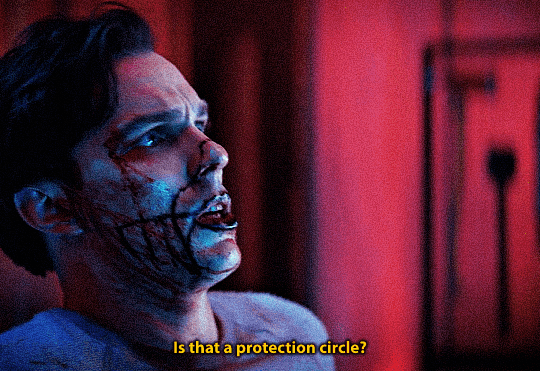


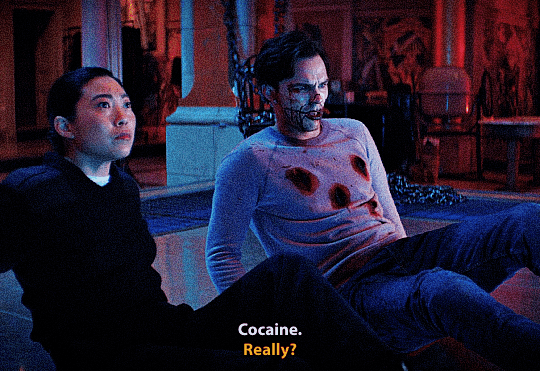
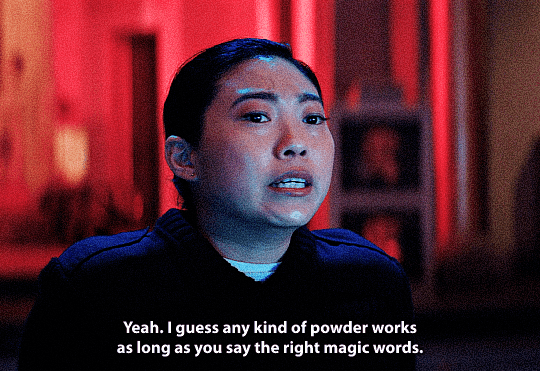
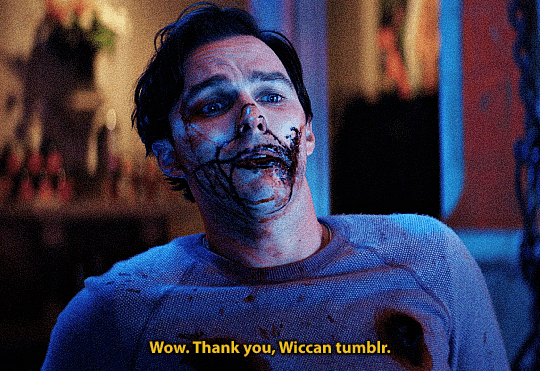
RENFIELD (2023) dir. Chris McKay

#RENFIELD TRIVIA RENFIELD TRIVIA LOL#thank you for this knowledge and i'm glad you found the original lines#addicted-to-the-knife#skqll#renfield 2023#renfield meta#robert renfield#rebecca quincy#cage dracula#cussing#tumblr
3K notes
·
View notes
Text
On Horror, Queerness, Mirrors, and Dracula



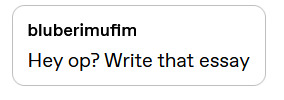

Your wish is my command (you may or may not regret this).
Here’s the thing - I love horror, and I love patterns, and I think the best horror is always in some sense symmetrical. It might not be obvious, but what’s the point of staring into an abyss if you can’t see your own face reflected back? The symmetry itself comes in any number of different twists, whether it is familial, communal, erotic, or individual, and most of these apply to Bram Stoker’s Dracula.
The centre of our novel rests on the Harkers. So, starting with Jonathan - his experience in Transylvania is a twisted version of his life back home. Dracula is reserved but eloquent, seemingly caring and occasionally affectionate, he reads train schedules and they spend hours upon hours in conversation; which is a dark mirror to Jonathan’s train schedule-loving, passionate but serious Mina. It may even be said that the Count is re-enacting a caricature of traditional heteronormative domesticity - he maintains the household, waits on his guest himself, and blows him kisses from the stairs. His possessiveness of Jonathan is the only way a vampire like Dracula is capable of understanding the bond Jonathan shares with Mina. The Count states that he, too, feels love; but he is written by a closeted gay man in the late 19th century, so his imitation of married life is both a lie and a tragedy. He is a shorthand for forbidden, wrong, and corrupting desires.
At the same time, Mina herself also has a same-sex connection in the beginning of the story, and her relationship with Lucy mirrors the relationship between Jonathan and Dracula. They cling to each other, in a sense; despite being excited about the prospect of their impending marriages, there is some trepidation associated with this new stage in life. A common part of a dowry used to be a shroud, simply due to the frequency at which Victorian wives died in childbirth soon after the wedding; and even provided a survival, the transition to married life was still a loss of innocence. As such, Lucy’s affection for Mina is the last expression of her girlhood, and she herself is the personification of Mina’s. Lucy is, therefore, the direct antithesis of the Count; her death and subsequent rising change Mina the same way that Dracula does Jonathan, establishing a firm duality between the Harkers and their respective vampires.
The other characters are reflections of each other, as well; the suitors defend while the brides terrify, Van Helsing wants to preserve life while Renfield wishes to consume it - and even further, the old Hungarian lady cares enough about a stranger to give Jonathan a cross for protection, while Lucy’s own mother lets Dracula into the house herself, selfishly ignorant of her daughter’s needs and the doctor’s orders. Another parallel is drawn again between Jonathan and Renfield, who represents directly what he could have been, had he not escaped from Dracula’s grasp; which makes Renfield’s vehement, last-ditch attempt to protect Mina perhaps all the more poignant. In him, she sees the resilience of Jonathan’s humanity; while he gets to see exactly what she could become after her turning - in Dracula himself. These dualities are integral to the story’s thematic structure, and therefore inextricable from each character’s development.
There is really too much to say about each individual dynamic to fit into one rant, but for the current purposes, I can forgo the details. They all converge as it is on Jonathan and Mina, and thus, the central theme of this story is devotion. If Jonathan had truly broken, like Renfield, Mina would have stayed by his side; and if she had fully turned, like Dracula, he would have adored whatever shred of her still remained. In madness and in death, in happiness and sorrow, in sickness and in health - until the echoes start to sound like wedding vows.
@stripedshirtgay
@bluberimufim
#dracula#dracula daily#jonmina#jonathan harker#mina harker#dracula meta#bram stoker#y'all asked for this#now scream with me bc i've been internally screaming about this for years#it's about the DEVOTION#lucy westenra is mina's innocence#dracula is jonathan's fear of inadequacy#renfield is his humanity#dracula is an evil version of mina i said what i said#that's Partially why jonathan wasn't weirded out enough#like yes yes eccentric old count#but he writes a diary in shorthand#and his fiancee loves train schedules#who's he to judge
515 notes
·
View notes
Text
There's just something about how Lestat starts off his vampirism so morally uncomplicated, so easy to root for, comically good natured. what a good boy! what an upstanding young man! he's only killing cutthroats and murderers! he's dressing Like That so that highwaymen try to kill him first! he's sending money home to ma!! and the family! IMMEDIATELY! he doesn't even like his family and they don't love him! he pays off his old boss's debts! he pays his boyfriend's nicer rent! buys him violin lessons! does all this at a distance because he doesn't want it to be emotionally awful for them. he's constantly contemplating the nature of goodness and what that might mean!
and then he has one (1) kinda shitty day night and he's killing and eating a mother and child on the sacred grounds of Notre Dame. not because he has to. he does not. not because he isn't in control of his actions. he is. not for the sadistic pleasure of it--there is none--and not to be evil for the sake of evil. a poor woman checks on him, sees his bloody clothes and tries to drag him to safety and get him medical care, because she thinks he's hurt and she wants to help, and Lestat kills her. not out of evil or malice or sadism, but because he chooses to, because he's fully swapped out good vs. evil for aesthetic judgements, because the nature of vampirism itself changes him so fundamentally.
and that's horror. even a man who is pure in heart and says his prayers by night, to steal from another monster genre. there is a fundamental loss there, a change against his will that's nothing to do with superpowers, a change so wide and deep that even as he is aware of it, he isn't really alarmed. he just reasons his way through it. and the audience cheers for him, of course. but nothing he does is justified. and that's the horror of it, too, that a monster could be so likable and yet so fundamentally alien.
#the vampire lestat#the vampire chronicles#lestat de lioncourt#horror#meta#anne rice#text post#renfield (the movie) could NEVER#most authors today wouldn't dare. would NEVER. they'd make you wade knee deep for the therapy speak justifications#about why what the character did was actually totally okay and morally correct
269 notes
·
View notes
Note
Good observation that Dracula's great grimness at informing Jonathan that they must part soon changing to his usual smoothness when Jonathan refuses to return to his room as dictated. Or gives Dracula the pleasure to go "before we part and before you become one of us let's play one more time, lets see you walk back into my arms from danger once more, for good this time". Maybe he even expected this small rebellion from Jonathan, knowing him. Especially after he dared scale his walls. It's more satisfying to "earn" Jonathan's submission. An unbreakable will bending to his is sweeter.
I think Dracula absolutely loves Jonathan's stubbornness... but only with the caveat that he is in control of the situation and can prey upon it. This response is extremely belated, but I kind of like answering it now because I think Dracula's treatment of Renfield so far, as opposed to Jonathan, is so revealing. He's ignoring Renfield completely. He has no interest in him at all. Because Renfield wants to be with Dracula. And Dracula doesn't care to spend his time with people who want to be around him; he's only interested in forcing his company upon those who don't want it. It's a huge part of the fun for him.
If someone like... Seward, for example, had been sent to Castle Dracula, he wouldn't have lasted anywhere near as long. Because I think he would be too enticed/interested in the vampires, and thus he'd bore Dracula a lot faster by being too willing or even eager to play along. Then again, someone who refused to play along at all would get boring very quickly too - if they don't submit and play his game he'll force them into submission with violence and that'll be the end of it. Jonathan managed to thread the needle perfectly with playing along on the surface while still constantly trying to resist behind the scenes. It was interesting and fun, a challenge that never made Dracula feel truly threatened. (Of course, he didn't realize the full extent of Jonathan's resistance/that he did have cause to be threatened...)
And he loved it! He was having so much fun! He got to genuinely enjoy Jonathan's company, but also enjoy how little Jonathan enjoyed his company and how he couldn't do anything about that. He got to keep pushing and pushing and pushing him and watch Jonathan almost break again and again but still just keep bending. To tempt him into disobeying and then punish him for it. To force him to rely on Dracula himself for protection and thus stick even closer the more endangered he gets. He gets to work for it, while at the same time never actually facing real risk other than losing his new toy (and Jonathan always settled down in the end, always let the game continue). ...And then he had to call it quits, because he had a schedule to keep. Yeah, I think he was genuinely kind of upset about that. And so when he got the idea for the wolves, he cheered way up again.
Because Dracula was able to offer Jonathan exactly what he claimed he wanted, but in such a way that they both knew he would never accept it. Instead, he forced Jonathan into a situation where he was forced to "choose" Dracula instead, one last time and more definitively than ever before. It was the perfect way to end their time together. Well, except one final victory - 'rewarding' Jonathan's choice by honoring it with one last night together, with delaying no longer and finally drinking from him.
Contrast all of that to Dracula's complete disinterest in Renfield, despite his avowed goal of conquering England and spreading vampirism here. You'd think a servant who willingly came to him would be helpful for that. But no, because Renfield came to him truly willingly, wanted to enter freely and of his own accord.
Dracula likes the kind of person who enters freely and of their own accord... because they're alone in the wilderness with wolves at their back. He likes those who stay because doing otherwise would be their certain death. He likes those who don't want this (who struggle and struggle, who have an unbreakable will) and yet are forced by him into accepting anyway.
An unbreakable will who bends at his command - that's how Dracula saw Jonathan, and he loved him for it. Right up until the point he decided he was finished, and acted to break him once and for all anyway.
#dracula daily#count dracula#jonathan harker#renfield#anonymous#replies#LITTLE DID HE KNOW THOUGH#sure he broke him a little but not completely. jonathan made it out and now he's got mina#my meta
225 notes
·
View notes
Text
I got an ask about the parallels between the older man/younger man relationships, specifically Dracula/Jonathan, and Van Helsing/Seward in Dracula but since it includes spoilers I'm going to include it under the cut!
What you said about old men having complex relationships with young men in Dracula got me thinking! Dracula is the old man. Young Jonathan comes to him in his land. Then Dracula does the same, and hurts him more. Van Helsing is the old man. Young Jack comes to him in his land. Years later Van Helsing does the same, and helps him more. There's power imbalance between the Count and Jonathan, which the Count exploits to the exptreme. Van Helsing and student Jack had mutual respect and no abuse of power. Dracula fed on Jonathan to restore his own life before the journey, Jack sucked van Helsing's (unclean|) blood to save his life. Due to this, van Helsing owes him a favor and they're bound by mutual love. Dracula is an old man who prays on the young man under his power, van Helsing is a guide and a role model. Funnily, both of them touch the younger man unprompted or barge in, but Dracula is invasive and power establishing, while van Helsing is genuine friendliness and familiarity.
You are so right! But there's another relationship that gets lost in all this: Renfield and Jack's antagonistic relationship. (Dracula Spoilers Below)
I think its interesting how much Jack becomes Renfield's tormentor, as a kind of inverse of what happens to Jonathan in Dracula's castle. Jack's asylum is in fact a large home, similar to a mansion, and he chooses Renfield to obssess over just like how Dracula chooses Jonathan.
In terms of structure I find it really clever that the majority of Jack's interactions and fascination with Renfield happen after Jonathan attempts to escape the castle, and way before Van Helsing enters the story. Its like a pendulum swing, going from Dracula, who is very clearly a predator, to Renfield, who is misunderstood yet enthralled by Dracula, to finally Van Helsing, who is seen as a savior.
Renfield doesn't get any respect for his personal well being and his privacy is compromised because of Jack. I think there is a scene where, after Renfield gets sick from eating the birds, Jack takes his diary and attempts to read it. This reminded me of how Dracula read Jonathan's letters and burned the shorthand written one to Mina. Also, how Renfield attacks and drinks Jack's blood after solitary confinement is reminiscent of how Jonathan attacks Dracula in his coffin, scarring him permanently. They are both lashing out at the abuse they've received.
Then there's Renfield and Van Helsing both being subjected to Jack's study of them. And I honestly believe Renfield reminded Jack of Van Helsing in some way or the other. So there is something to be said of all three relationships. All three old men maintain a level of secrecy from their younger male counterparts, and they all desire to overcome loneliness and become relevant again. For Dracula that's power and conquest, for Renfield, validation and a longer life, and for Van Helsing, to be respected and part of a family again.
I'm sure there are more parallels that others can point out. But these were the ones that I could recall easily.
#dracula (novel)#jack seward#abraham van helsing#renfield#r.m. renfield#jonathan harker#dracula daily#dracula spoilers#dracula meta#thebibi on vampirez#thebibi answers
152 notes
·
View notes
Text
So i noticed something but I'm too stupid to write a proper meta so have a venn diagram:

#renfield (2023)#robert montague renfield#rebecca quincy#teddy lobo#tedward lobo#I was gonna make a gaslight gatekeep girlboss joke but I'm not sure who's gaslight and who's gatekeep#i think renfield is gaslight and teddy is gatekeep but unsure#character analysis#my meta#my posts
25 notes
·
View notes
Text
Anyway, fuck Dr Seward. He took away Renfield's agency, never showed him respect, and encouraged his delusions b/c he saw Ren as a novelty he could use to "advance [his] own branch of science" (90) if he made a study of him. Renfield comments on this when he stops eating live animals, saying Seward will need to get himself a new patient with zoophagy (320), b/c he knows that's all Seward wants — an interesting case study, not to sincerely help him.
Seward regularly puts Renfield in a straitjacket, chains him to a padded wall despite his awful cries (127), has his staff hurt him, and still has the audacity to think Ren should view him as a friend when he views Ren as nothing but a "pet lunatic" (179). And Ren does call him a friend, words dripping with sarcasm, but the sarcasm goes over Seward's head, he's such an egotist. He doesn't even get, when Ren says: "They think I could hurt you! Fancy me hurting you!" (132) it's b/c Seward's the one with all the power, hurting him.
Renfield's powerless in that asylum. He can't seriously hurt anyone. Seward just doesn't see himself, or his actions, as abusive. But he doesn't view his patients as fully-rounded people. It doesn't matter who they were before they came to him. Renfield's life before his delusions? Never comes up in his entries. Who he could be after he left, if his condition were managed? Irrelevant. All Seward sees is a case study that could make him famous. If he actually cared about his patients welfare, he'd have listened when Ren came to him in distress.
Ren only served Dracula b/c he took advantage of him, a desperate, lonely, delusional, queer, mentally ill older man who had once been respected by his peers before losing everything, and fed his fixed idea. A man who no one would believe. A man who would be easy to kill once he'd served his purpose. A man who wouldn't be missed, if he disappeared. Men like that disappear all of the time.
Seward saw the danger Renfield was putting himself in by meeting Dracula alone, but didn't stop him. When Ren tells him he'll die if he isn't sent away, Seward refuses to help. Renfield wanted to escape. His death wasn't a 'sacrifice,' that implies it was his choice to stay & die for someone he hardly knows. If Seward answered his prayers, Renfield would have fled and saved himself. He'd have neither helped nor stopped Dracula. B/c he wanted to live! He was in love with life! His entire monomania revolved around the desire to live by any means necessary, even stealing what hours he believed the lifeblood of a fly could give him! Instead, Seward kept him trapped in his cell, and left him to be murdered like a rat in a cage. A tragedy that could have been avoided if anyone had simply listened to him!
#still yapping day 7#dracula#renfield#too many dr seward defenders out there. he's not worth it#get yourself a man who eats flies & live sparrows and isn't ableist#sorry I'm a renfield stan first and a person second or third#he should get revenge on everyone who works at that asylum then burn it down. and also a kiss on the head and warm cocoa#I'm not reading the book again I just only see meta about everyone else and I don't care about anyone else so have these shower thoughts#page numbers from the penguin 94 edition its what I had on hand
8 notes
·
View notes
Text
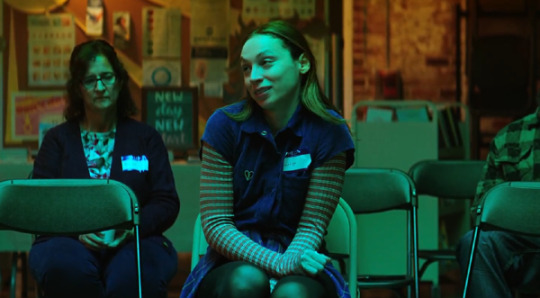

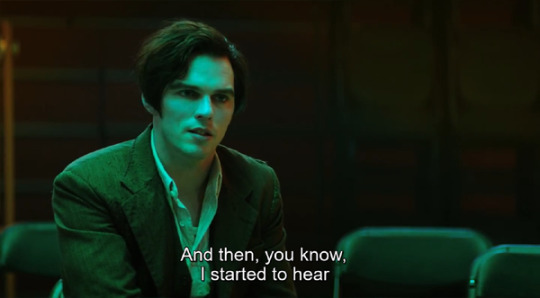
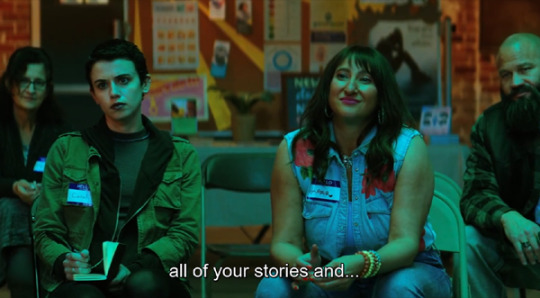
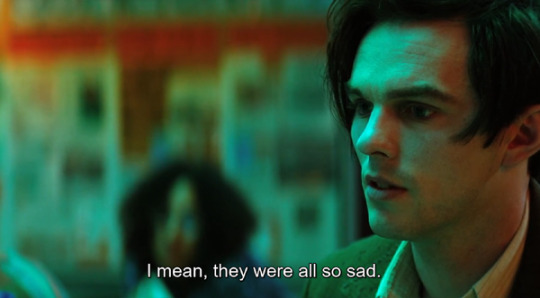
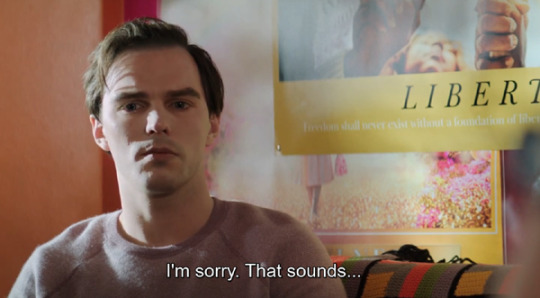
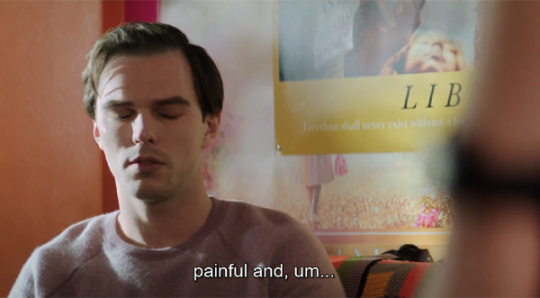
Googling "empath" + codependent I just wanna see something.
#renfield#renfield 2023#meta being written in my drafts folder part 2#he's the 'most prolific serial killer the world has ever known' TO YOU. i just wanna talk about how he's overflowing with empathy despite#his own situation being 1000x more dire like intestines-outside-the-body bad
116 notes
·
View notes
Text
More potato quality, but ugh this scene, his grin. The timing. The parallels to the one where he's bleeding on the floor instead.
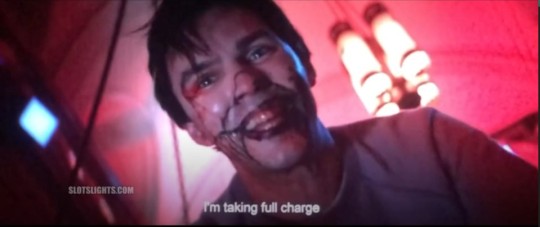


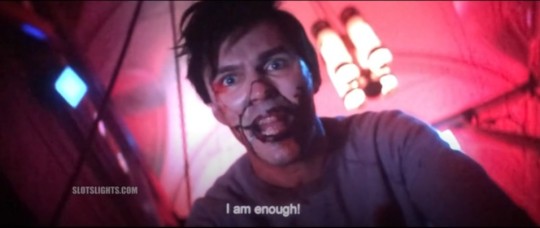

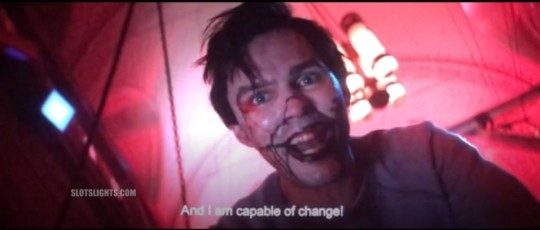

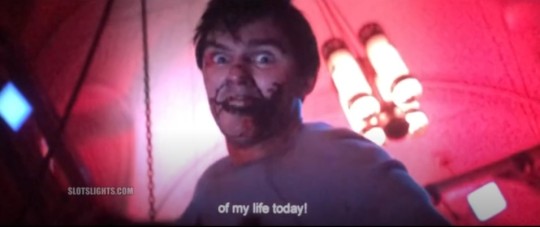
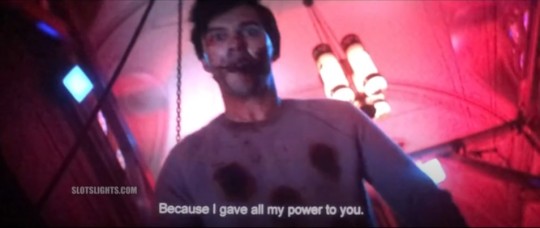

He's been fighting and is covered in his and Dracula's blood and is absolutely beautiful. Look at him, owning his mistakes and then finally fully taking himself back. Taking his own name back Contrasted to the confrontation in his apartment where he's cowering away and still using the book as a literal weapon, seeing him remember he's strong and remember he can fight, and then turning that back on Dracula for himself is just *chef's kiss *
#the world is full of Renfields#renfield#renfield spoilers#renfield 2023#robert montague renfield#I could do a whole meta on how he's reclaiming his name along with his identity#after he was reduced down to a lacky with only one name that was used as a label#turning it around that they're not just interchangeable followers#but people who've given up their power and individuality like him#but he's asked Rebecca to call him Robert#and he's told someone he had a family#and been looking after his own personal needs#like personal space and hygene and clean clothes#and been seen and called by his own name again#and finding himself again gave him the true power to fight back
417 notes
·
View notes
Text
Fraser likes telling, manipulating inspiring people to do what he wants them to do.
And he really likes it when they don't ask questions and just do the thing. The world would be a better place if everyone just followed his orders lead.
He's not even pretending to care if Turnbull knows.
"Good man"
#benton fraser#due south#Renfield Turnbull#Let Fraser just tell everyone what to do#and how to act#it would make him very happy if you followed his orders#thank you kindly#he can follow orders#you can too#Fraser is a dom pretending to be a sub#Also Fraser is not convinced that he is right in the head#and secretly does not trust his own judgement sometimes#but does want everyone else to blindly trust him anyway#all those tags barely have anything to do with this gif#but big picture#meta in the tags
29 notes
·
View notes
Text
Today's entry is another one with strong comparisons to be made between the asylum pair and the castle pair. We start off with Renfield-Dracula comparisons: both his eating other creatures in order to gain life and his cheerful attitude here remind me of the Count. Whenever Dracula had won some new victory over Jonathan (typically by doing something offscreen to foil his latest effort) he tended to get very cheerful and charming. Renfield has circumvented Seward's refusal to give him a cat by eating all his birds and then restarting his experiment, a victory of sorts for him, and is correspondingly quite cheerful.
But it's Seward's response to this behavior which is especially reminiscent of Dracula, and chillingly so: he drugs Renfield to sleep and then goes through his belongings.
I gave Renfield a strong opiate to-night, enough to make even him sleep, and took away his pocket-book to look at it.
While it's never explicitly confirmed, I have a theory that Dracula had been exercising control over Jonathan's sleep throughout his stay in the castle. There are repeated instances where he tells Jonathan to rest well or to sleep soon and Jonathan always follows up with confirmation that direction was followed (when other times there are hints towards unsteady sleep/nightmares). And while it isn't as directly a scene of magical influence, the day Dracula stole Jonathan's papers and other belongings was while also he was locked in a room, sleeping.
That's creepy enough, and it speaks to Seward respecting no boundaries at all with his patient, but the part that sticks out to me most of all is the way this is a direct parallel to a worst-case scenario for Jonathan. Because what is described above is quite simply: the captor, having noticed his captive is keeping notes that he doesn't understand, forces his captive into a vulnerable unconscious state and takes said notes to read and use for his own purposes.
Isn't that exactly what Jonathan lived in such dread of happening, all that time? If Dracula had ever spotted Jonathan writing in his journal, I'm sure it would have happened. And while he wouldn't understand the exact meaning of the shorthand (much the same way Seward doesn't initially understand all Renfield's figures) the gist of the idea would be communicated (he'd realize Jonathan is keeping a secret record and the implications of that, much the same way Seward here is able to finally put together the pieces and figure out Renfield's general ideas). And what comes next? Well, it wouldn't be good for Jonathan, obviously.
Seward doesn't punish Renfield for what he discovers. Not directly. But his reaction is just as terrible because the realization tempts him all the more to indulge his 'mad scientist' instincts. He wants to make a name for himself via Renfield's heretofore unknown madness, and it doesn't really matter how Renfield feels about that or is treated in pursuit of that. Oh, sure, he confines himself here to speculation about whether it might not be worth it to see how far he'd go - tells himself I must not think of this. And yet he's incredibly attracted to the idea (re:dracula did so well with putting voice to how EAGER he is and how reluctantly he pulls himself back - and then only partially before dipping his toes in again), and is already behaving well outside of any appropriate motivation. And so... while Renfield isn't going to suffer in the same way Jonathan would have from the discovery of his diary, he still is worse off. By completing his long-awaited thought and coming up with a name for Renfield ("a zoöphagous (life-eating) maniac") Seward has fully finished shifting him into a mental category entirely separate from all the other patients, and it's definitely not one that has his best interests in mind. He's possessive, too invested, dehumanizing (yesterday's "my friend" has become today's "my homicidal maniac"), and it's all just not good for either one of them.
I think Seward realizes that this isn't good for his own mental health as well, but he can't help longing for it. This is getting more into just me musing aloud here, but... A while ago he spoke about relative dangers of selfish vs. unselfish people, and concluded that people who dedicate themselves to a duty are more dangerous because they throw themselves in fully. And yet that's something he seems to be longing for:
If only there were a sufficient cause! I must not think too much of this, or I may be tempted; a good cause might turn the scale with me, for may not I too be of an exceptional brain, congenitally?
He knows that he is susceptible to that kind of temptation, to ignore all moral qualms for the sake of (making a name for himself with) Science. And he's trying to pull himself back from that brink... but a part of him wants nothing more than to find a cause worthy enough to do it anyway. He wants to dedicate himself fully to something important. He knows that he isn't entirely normal himself, and that once he gave in there would be no turning back. The idea appeals to him, even as it repels him - which in itself is very vampiric, actually. It's like the idea of finding a "sufficient cause" is his own trance which he must try to resist.
And the way he thinks of Lucy right after this seems telling to me. Perhaps he hoped that Lucy would balance him out, would help pull him away from these kinds of impulses, would make him Normal in a way he can't be on his own. But she didn't pick him, in fact she picked a man who is also much more Normal, and they're both wonderful and happy together. And he's happy for them, of course, but it leaves him on the outside. And on the other hand there's Renfield, who seems fully lost (and happy to be so) inside his own mad devotion to his cause. Seward seems to be pining after both Lucy and Renfield in this entry. Not romantically for Renfield, but they represent to him opposite extremes. Lucy is the life he could have if he didn't feel so drawn to odd and amoral ideas; Renfield is the fulfillment he could feel if he didn't feel sufficiently sane to let morals hold him back from indulging those urges. He knows Lucy doesn't love him back (symbolically: that he can't ever be fully normal) and that Renfield isn't someone to imitate (symbolically: that he can't let himself give in fully), so he's just stuck teetering between them at the moment. Of course, with Lucy's rejection leading him to isolate himself in his work (and away from his friends who also pull him back more to better behavior) he keeps tipping more and more towards becoming mad himself in his own way. But he still retains enough control over himself to feel bad about it and refuse to indulge himself fully... even as he fails to notice, or simply doesn't care, just how badly he's already failing to act in Renfield's own interests.
#dracula daily#jack seward#renfield#just kinda thinking aloud do tell me if this makes sense#the audio had this kind of longing tone for BOTH lucy and the mad science which was super interesting to me#count dracula#for those comparisons/parallels#my meta
135 notes
·
View notes
Text
One of the reasons I have absolute goo-goo eyed swiss cheese brain over this movie is the side characters. Everyone is so much FUN! Even the characters with only one or two lines are memorable, because every single actor commits to the bit. In any other movie, the support group characters would basically operate as one bland, homogenous whole, but everyone in the group is uniquely characterised and they just pop, even weird Kevin! There's barely 500 fics on ao3 and every named character has at least one, as do some unnamed characters. Do you know what kind of writing it takes to get people excited about a character credited only as "ant kid"?
#like dont get me wrong im as here for the pathetic little meow meow as all the rest of you#but i think we can and should appreciate that this movie is genuinely a fantastic work of cinema#the artistry doesn't stop being valid or important just because it's funny#renfield (2023)#renfield 2023#my meta#my posts
13 notes
·
View notes
Text
Seward's bone deep desire to run away from the asylum is not exactly surprising. There have been a lot of really good meta posts about how the return of Van Helsing into his life is the turning point where we see the caring and good side of him and how we can interpret his life as a student in Amersterdam as one of freedom and happiness. How he is part of the tragedy of manners, how strict social expectations allow Dracula to persist, and how they only exacerbate the unhappiness of the characters.
And I think the tragedy of Seward is that, really, he should not be the head of an asylum. It's a job that brings him no joy, and he's BAD at it. We can all recognize that if your first reaction to going back to work is "What if I just leave it all." That isn't a healthy work environment.
Now, in the modern day, the ability to pick and choose a work environment, even to leave one that is damaging your mental health, is a privilege. (IT SHOULDNT BE, but it is). And, although it is definitely reaching crisis levels in modern times, major changes in your career have almost always been difficult (unless you are really rich, or a particular brand of academic in the 17th-18th century, or both).
Seward can't just leave and become a surgeon. To give up the lofty position of "Head of an Asylum" would be unthinkable in the 1890s, especially for a reason like "Being here is basically turning me into the Joker." Like, how would Seward explain that in polite society? Would they accept that reasoning? Would they create salacious gossip if they didn't? Can Seward leave his position without losing a great amount of social capital?
Probably not.
His rise to head of an asylum, as many have pointed out, was meteoric, to say the least. It has afforded him status and respect and also left him deeply, deeply fucked up. And he can't leave!
I think his desperate attempts to quantify Renfield's behaviors into a new mental illness are telling in this regard. Maybe he is too used to having to meet some sort of expectation, and now he thinks this is the logical next step (It's NOT, but I digress). The feeling of having to keep performing above expectations, grasping at straws to do so, and subsequently burning oneself out (as well as others around you) and engaging in unethical practices? Idk. It sounds like something that would happen today. (tbh there are probably a ton of Sewards out there today, as there are still systemic problems within the mental health system that allow for the dehumanizing and abuse of patients).
It doesn't excuse his behavior. Nothing he does to Renfield is excusable, but I think it does explain some of the *why*. He isn't just cruel for cruelty's sake.
So, tldr I guess: I think reading Seward as someone who got stuck on a career path that he realized was unfufilling and that he ends up hating. Social conventions restrict him from just quitting without and a (socially acceptable) good reason to do so, and a lifetime of being regarded as one of the smartest people in the room means he can not allow himself to fail. Unfortunately, this also means he can not admit when his actions or his ideas are wrong when it comes to his job.
(But he can show that uncertainty FOR Lucy, and TO Arthur and Van Helsing, which speaks his trust and love for them)
#dracula daily#jack seward#re: dracula#i think im rambling#but this kind of hit me#Jack's trapped in the asylum too in a way#only difference is his place of power allows him to take out that frustration on others#and i think it speaks VOLUMES that one of Jack's first entries was about how he regretted exacerbating Renfield just to study him#and as the sleepless nights and days filled of performing a job that he hates (and cannot bring himself to admit he hates)#as well as the depression from rejection#he stops feeling guilty
725 notes
·
View notes
Text



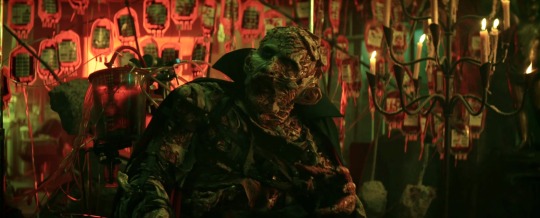
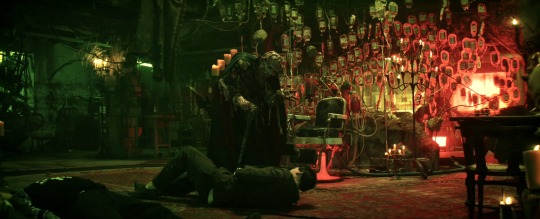
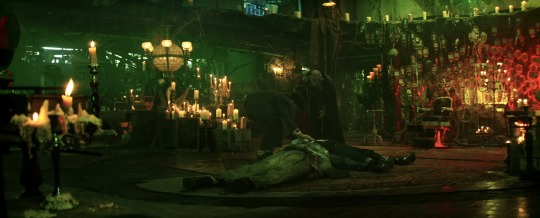
the blood bag throne??? the candles??? the chandelier??? we need to give renfield his own home makeover show bc that man knows how to transform a space
#spookytuesdaypod#ol-rimsey#renfield 2023#renfield meta#cage dracula#heavy post#<- 'cause unhealed dracula may give a spook to some people lol#robert renfield#travelersmindpalace#cataradical#pinkiepiebones#OH LOL I PICKED A RANDOM DAY TO SCHEDULE THIS FOR#HAPPY FOURTH O' JULY SUCKAS
238 notes
·
View notes